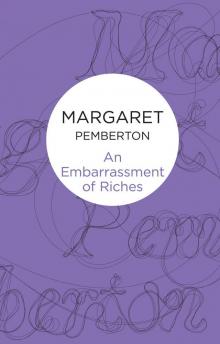- Home
- Margaret Pemberton
The Flower Garden Page 7
The Flower Garden Read online
Page 7
He pushed his empty coffee cup away bad-temperedly. Sanford’s son was back in New York and doing the social rounds. Gloria was kitting herself out for the next few months and it was inevitable that they should be present at the same functions. The social world in which they moved was a small one. Theirs was a tight-knit élite; at least it was, outside Boston. In his home town Chips took great care to remain one of the boys. Instead of living in a palatial mansion in some distant suburb, he chose to remain in the exclusive but parochial Beacon Hill district. He was Boston’s mayor. He wanted to continue to be Boston’s mayor and to do so he needed the allegiance of the people of the city. His homes in Palm Springs and Rhode Island were given little coverage by the press. They barely knew of their existence.
‘I’m Irish, Catholic and a Bostonian,’ Chips would shout above the sea of faces crowding his election platforms. ‘And I’m proud of being all three!’
The crowd would roar its approval. The older inhabitants could well remember Patrick O’Shaughnessy’s beginnings in the North End and Chips continued to cultivate carefully the image of being a local boy making good. Of still being a North Ender, though Patrick had been a millionaire and living in Jamaica Plain by the time Chips was ten. Chips preferred the electorate to forget these aspects of his background. He spoke of the North End as if he had emerged from it only seconds before becoming mayor. ‘Make the people believe what they want to believe’ was his favourite maxim. It was one that had served him well.
The ringed face seemed to stare back at him from the printed page with unconcealed arrogance. The eyes were those of a predator. Ramon Sanford was every inch his father’s son and the warning bells in the back of Chips’mind began to ring loud and clear. He pushed his chair abruptly away from the table and crossed to the telephone.
‘The Ritz-Carlton, please. Mrs O’Shaughnessy’s suite.’
There was a click of a connection to the Ritz and the sound of the receptionist trying to contact Mrs O’Shaughnessy’s room. At last the apologetic voice informed the mayor that Mrs O’Shaughnessy was not answering and that, on inspection, her key was also absent. It was thought that Mrs O’Shaughnessy had left the hotel early on a shopping trip.
Chips slammed the receiver down and glared at his watch. It was barely 9:30. Gloria never rose before noon. If her room was empty it was because she hadn’t slept in it. He swept the newspapers off the table and into the waste-basket and sat thoughtfully. Few knew it, but he was a man who never reacted without thinking. He thought now while his two main aides waited impatiently in the dining room, anxious to speak to him before he left for City Hall.
When he married Gloria it had not been in a fit of besotted love, blind to realities. He had never been a fool and he certainly wasn’t an old fool. Since his wife’s death there had been many women. He was a man of immense physical energy and zest for life. Women were as necessary as eating and drinking. His capacity for the enjoyment of all three pleasures had not waned with his increasing years. Gloria was a lot luckier than many young brides with rich, elderly husbands. At least he still gave a more than creditable performance in bed. Sometimes he amazed even himself.
He had married because, at sixty-five, he had regained his life’s ambition. After an interval of nearly thirty years he was once more his city’s mayor. He needed a wife to provide a decorative trimming. He also needed to steer clear of scandal. Boston would not look kindly upon a mayor bedding down with floozies young enough to be his grandchildren. Chips had no intention of foregoing his favourite pastime. What could not be indulged in privately, could be indulged in openly. He would marry and enjoy himself with the church’s blessing. It was a marriage solemnized by the cardinal himself. Chips had hardly been able to keep a straight face throughout the service. The cardinal had been reluctant to perform the ceremony, but as there were no valid grounds for refusing to do so, he had had to acquiesce or face unfavourable publicity.
Gloria had been a waitress in a San Francisco roadhouse when Chips had first met her. As not even his most loyal supporters would have found this fact acceptable, Chips, with his usual gusto, had created a complete mythical background for her. She was an orphan, the last child in a family with a history going back to the days when Los Angeles had been El Pueblo de Nuestra Senora La Reina de los Angeles de Porciuncula. Her uncle, a recluse, had brought her up. The recluse was uncontactable – obsessed with his privacy. The improbable story had stood the test of time. If anyone privately wondered whether Gloria O’Shaughnessy was all that she was reputed to be, they never had the temerity to voice their suspicions.
The marriage had been nothing but an asset to him in his career. Having Gloria on his arm automatically took twenty years off his age in the eyes of the electorate. The only thing that could damage him would be if Gloria’s name were to be linked romantically with that of someone else, by the gossip columnists. Then he would no longer be the virile, devil-may-care boyo from the North End, but simply an old and gullible fool.
Gloria’s shopping spree in New York had gone on long enough. It was time she returned to Boston and acted out her role of adoring wife. Gloria’s denials were a foregone conclusion. If he wanted to know who she had been pussyfooting around with in New York he would have to find out by more subtle means. He reached for the telephone again and called a number that was never written down, not even in his private diary.
‘Hello Chips! Nice to hear from you,’ a male voice boomed over the line. ‘I see you’ve been hitting the headlines again.’
‘Merely serving my country,’ Chips replied drily. ‘Duty before pleasure and all that. Retirement would be sweet, but public service calls.’
‘Ass-holes,’ his listener said disrespectfully. ‘What is it you want?’
‘The low-down on my dear wife’s activities these last two weeks. She’s been in New York supplementing her wardrobe and debilitating my bank account.’
‘And you want to know if she’s been shopping day or night?’
‘Exactly. And if she paid in cash or kind.’
There was a deep chuckle. ‘I told you you were taking too much on, you old goat. Twenty-three-year-olds are bad for the heart. They induce palpitations.’
‘They induce a lot more, thank God.’
There was loud laughter. ‘I’ll check out your beloved’s nocturnal activities and let you know immediately.’
‘Thanks.’
The receiver was replaced. He would have Gloria sewn up so tight by the end of the week that she’d never travel farther than Brookline without an armed escort. He opened the door and admitted his aides, listening attentively as his valet adjusted a heavy astrakhan coat around his shoulders.
‘We need to talk about the longshoremen, Mayor. Their vote is vital and we can’t discuss that at City Hall with Sean Flynn listening at every keyhole.’
‘The longshoremen are in our pockets,’ Chips said complacently, donning a grey velvet fedora, more suitable for a Mafia gang boss than a mayor.
‘They’re campaigning hard against you and it’s going to be a tough fight; a lot tougher than the last.’
‘I’m used to tough fights,’ Chips said, taking the ebony-topped cane held out for him. ‘I enjoy them.’
He swept from the house and they hurried in his wake, still clamouring to be heard.
‘Henry Mortimer, the reporter on The Globe, says the word “graft” has already been used. If The Globe should turn …’
‘They’re putting up a candidate who is promising to dispense with all ward bosses; to revolutionize local politics …’
Chips entered his glossy black sedan. The two aides were relegated to their Ford. This was the part of the day Chips liked best. His chauffeur had strict instructions not to slow down for pedestrians, traffic or any other minor inconveniences. Flags flew on either side of the motor car; the horn blared almost perpetually as Chips O’Shaughnessy rode in state to the centre of his kingdom. If he could have been preceded every morning by a brass band he would
have been even happier. He was a man, he reflected, born out of his time. He should have been a Roman emperor or Mogul warrior. He was convinced the blood of Irish princes ran in his veins and he acted accordingly. Indulging all the dash and flair of which he was capable, he made his ostentatious entrance at City Hall and proceeded to conduct municipal affairs with oblivious disregard for anyone else’s judgement but his own.
He had waited too long for power and had enjoyed it for too short a time. He had made history by being the youngest mayor to hold office. His future had shone before him, limitless in its possibilities, and in those heady days there had not been a man or woman who didn’t believe he would be re-elected. Not all of them wanted it: there were plenty who objected to having their city run by a genial-faced, shrewd-eyed, ruthless dictator who had come to power via the ward bosses; yet all had believed that the dictatorship would last for at least another four years. His withdrawal from the election only hours before polling had stunned the city into immobility. Old Fergus Conway had died of a stroke and his widow had laid the blame fairly and squarely on the shoulders of O’Shaughnessy. No explanation had been given – or at least none that was believed.
His assertion that he was bowing out of the race because his four years in office had shown him that the city needed a mayor of more maturity, had been poo-pooed even by schoolchildren. Lack of maturity had never been apparent during his term as mayor. Besides, the speech had reeked of modesty, humility and candour. None of them were qualities that could be attributed to Chips.
No one in Boston ever knew the truth – not even his family. The only person to know why Boston’s flamboyant mayor voluntarily stepped down and remained a ward boss for the next thirty years, was Duarte Sanford.
Chips was signing a paper confirming the building of a new freeway when, unexpectedly, the memory engulfed him. The hatred of years surged through his veins and his hand trembled violently.
His secretary looked at him anxiously. ‘Are you all right, sir?’
‘Of course I’m all right,’ Chips snapped, signing the documents with a flourish.
What the hell had brought that on? The face he had so heavily ringed in the morning newspaper? The prospect of standing once again for re-election? ‘Goddamn it to hell,’ he said and wrote a refusal on the pile of requests before him without even bothering to read what the petitioners wanted.
Thirty years of waiting: thirty years of making politics his life and never being able to enjoy the highest office. His authority as a ward boss had been unchallenged, but what was power without its trappings? Very little for a man of his temperament. The day of Duarte Sanford’s death had been the happiest day of his life. Not an hour had been wasted. He had announced his intention to run for mayor when the existing incumbent still had eight months left in office. It had been a landslide victory: a balm for his bitterness. Immediately after the inauguration he had driven alone to Boston’s cemetary and had stood before the grave of his parents.
‘I kept my promise,’ he said, and bent down, letting the earth that covered the grave and on which carefully tended flowers bloomed, run through his fingers. It was Irish earth – brought from a land Chips had never seen for the parents who had loved it with all their hearts.
He had stayed until dusk and then he had returned to the celebration of his victory.
Four short years and gossip had it that he was going to retire. He smiled grimly as he went about the work of municipal government. Boston hadn’t heard the last of Chips O’Shaughnessy: or America either. If he did fail to be re-elected he would do what he had burned to do for years. He would run for governor. He laughed to himself out loud and his secretary pursed her lips. Perhaps those who thought sixty-nine too old for a man actively to pursue a public career were right. Perhaps the mayor was cracking up after all.
The speed of his dictation did not give her time to dwell on it further. Chips O’Shaughnessy was in his element working an eighteen-hour day and he expected all those around him to do the same.
‘Mrs O’Shaughnessy is calling you from New York,’ she said a little while later, grateful for a respite.
Chips had forgotten about Gloria. He kept her waiting while he lit a cigar and signalled his secretary to return to her own office. He blew a fragrant cloud of blue smoke into the air and said genially: ‘Gloria, how thoughtful of you to call.’
He thought he detected a note of strain in Gloria’s voice.
‘I’m sorry I missed you. I was out shopping with Mimi Farquharson.’
‘Ah,’ Chips said, as if this explanation clarified everything. His eyes were overly bright. Mimi Farquharson did not emerge into daylight until cocktail hours. ‘And how is New York? Lively as usual?’
‘The Winthrops are back from the Riviera. They’ve bought a villa at Cap Ferrat. The Whitneys gave a nice dinner party on Wednesday for the Peruvian ambassador.’
‘And how was the fancy dress ball?’
Gloria injected false gaiety into her voice as she said: ‘Splendid fun.’
For the sake of convention she had been escorted by safe old Billy Walters. The night had been spent with Ramon and there would not be another like it. Her head ached from crying.
‘I need you back in Boston for the rally tonight,’ Chips was saying.
‘Yes … Of course.’
‘Six-thirty?’ Chips raised his bushy eyebrows. Gloria was being unusually amenable.
‘Yes.’ Her voice was brittle and tightly controlled, but Chips did not notice. He was already feeling mean at having doubted her fidelity. If she had stepped beyond the limits of flirtation she would not be so willing to return to Boston.
‘I’ve missed you,’ he said gruffly.
‘Yes.’ It was a whisper.
He said ‘goodbye’and severed the connection. A big rally such as the Faneuil Hall one buoyed him up and set his adrenalin going. It was hard to return to an empty house after the euphoria of applauding crowds and the passionate singing of ‘The Star-Spangled Banner’and ‘The Wearing of the Green’. Gloria’s return would be doubly welcome. With her Gibson Girl curls and glossy lips, she would be sensational on the platform and his excess energy could later be released most satisfactorily.
An old opponent in the political stakes, Sean Flynn, was reputed to unwind after heavy electioneering by taking tepid baths and drinking hot cocoa. It was no wonder the man had never won the mayoralty. In Chip’s eyes he hadn’t the blood for it.
He lit another cigar and rammed his thumb on the bell on his desk. His entourage entered and Chips said with his usual zest, ‘Good morning, gentlemen. I believe the longshoremen need a little encouraging to give us their votes. Ideas please.’
Gloria mixed herself a Martini and stared in the mirror, dull-eyed. Her china-doll prettiness seemed to have blurred and aged. She had behaved like a fool. Ramon was not a man to tolerate feminine tantrums. Intuition had told her from the outset that his capacity for scenes was strictly limited and she had behaved accordingly: until yesterday. She drank the Martini without tasting it. Her friends had warned her she was playing with fire and she had taken no notice. She had been mesmerized by him. Power excited her: it was one of the reasons she had first been attracted to Chips. He was accustomed to power and revelled in it. It was a sensation Gloria understood. Ramon’s power was of a different kind. It lay in his complete domination over her body. She had wanted to keep him more than anything else in the world and her own behaviour had been instrumental in driving him away. She had behaved like the cigarette girl she had once been, shrieking and screaming, and he had treated her accordingly.
She poured herself another drink. What she had done afterwards had been even worse. Colour burned her pale cheeks. She had been so determined to prove to herself that any other man could take Ramon’s place that within minutes of his leaving she had brazenly rung Baby Santorini and intimated that she was free for the evening. Baby was the reason Loretta had taken a drug overdose. He had three wives behind him and more mistresses
than there were days in a year. If any man could drive Ramon from her mind it was surely Baby. It had been a disillusioning experience.
She had returned to her hotel suite feeling cheap and soiled. When a large bouquet of white roses had arrived half an hour later she had crushed them angrily into the waste-bin.
It was 9:45: she had had two stiff Martinis and no breakfast. Her head pounded. She wondered where Ramon had spent the night and who with. Three times she had asked the switchboard operator to connect her with his number and three times she had cancelled her instructions. She tried to recreate the short, hideous scene that had taken place between them. She had been the one who had angrily declared that their relationship was at an end. He had simply agreed, coolly and indifferently. He had done so because of her behaviour. Hope sparked into life. Perhaps it wasn’t too late. If she said she was sorry; if she was sweet and reasonable … She rang for black coffee and dry toast and sat down at the dressing table, applying cream and powder with hurried, shaking hands.
Half an hour later she left the Ritz, heavily swathed in white mink. When she arrived at Ramon’s apartment block she had to suffer the indignity of waiting until the doorman had ascertained whether or not Mr Sanford wished to see her. He did, and Gloria felt momentarily faint.
Everything was going to be all right. He opened the door to her, naked apart from a towel wound loosely around his waist. His hair and chest still gleamed with droplets of water from the shower. There was no sign of his valet.
She smiled tremulously. ‘I’m sorry for behaving like a fishwife, darling. Will you forgive me?’
Some yards behind the O’Shaughnessy limousine, Charlie Daubenay stubbed out his cigarette and emerged from his battered Ford. Gloria’s New York chauffeur was not a permanent member of the O’Shaughnessy staff and Charlie doubted whether the man would have the sort of loyalty that withstood the attraction of dollar bills. He tapped on the window lightly and lazed on the bonnet. The chauffeur wound down his window.

 The Summer Queen
The Summer Queen Moonflower Madness
Moonflower Madness The Londoners
The Londoners The Flower Garden
The Flower Garden Yorkshire Rose
Yorkshire Rose Vengeance in the Sun
Vengeance in the Sun Zadruga
Zadruga Beneath the Cypress Tree
Beneath the Cypress Tree Magnolia Square
Magnolia Square Party in Peking
Party in Peking Lion of Languedoc
Lion of Languedoc Forget-Me-Not Bride
Forget-Me-Not Bride The Guilty Secret
The Guilty Secret Rendezvous With Danger
Rendezvous With Danger A Season of Secrets
A Season of Secrets Silver Shadows, Golden Dreams
Silver Shadows, Golden Dreams The Four of Us
The Four of Us Devil's Palace
Devil's Palace Never Leave Me
Never Leave Me An Embarrassment of Riches
An Embarrassment of Riches African Enchantment
African Enchantment White Christmas in Saigon
White Christmas in Saigon Coronation Summer
Coronation Summer A Multitude of Sins
A Multitude of Sins Tapestry of Fear
Tapestry of Fear A Many-Splendoured Thing
A Many-Splendoured Thing